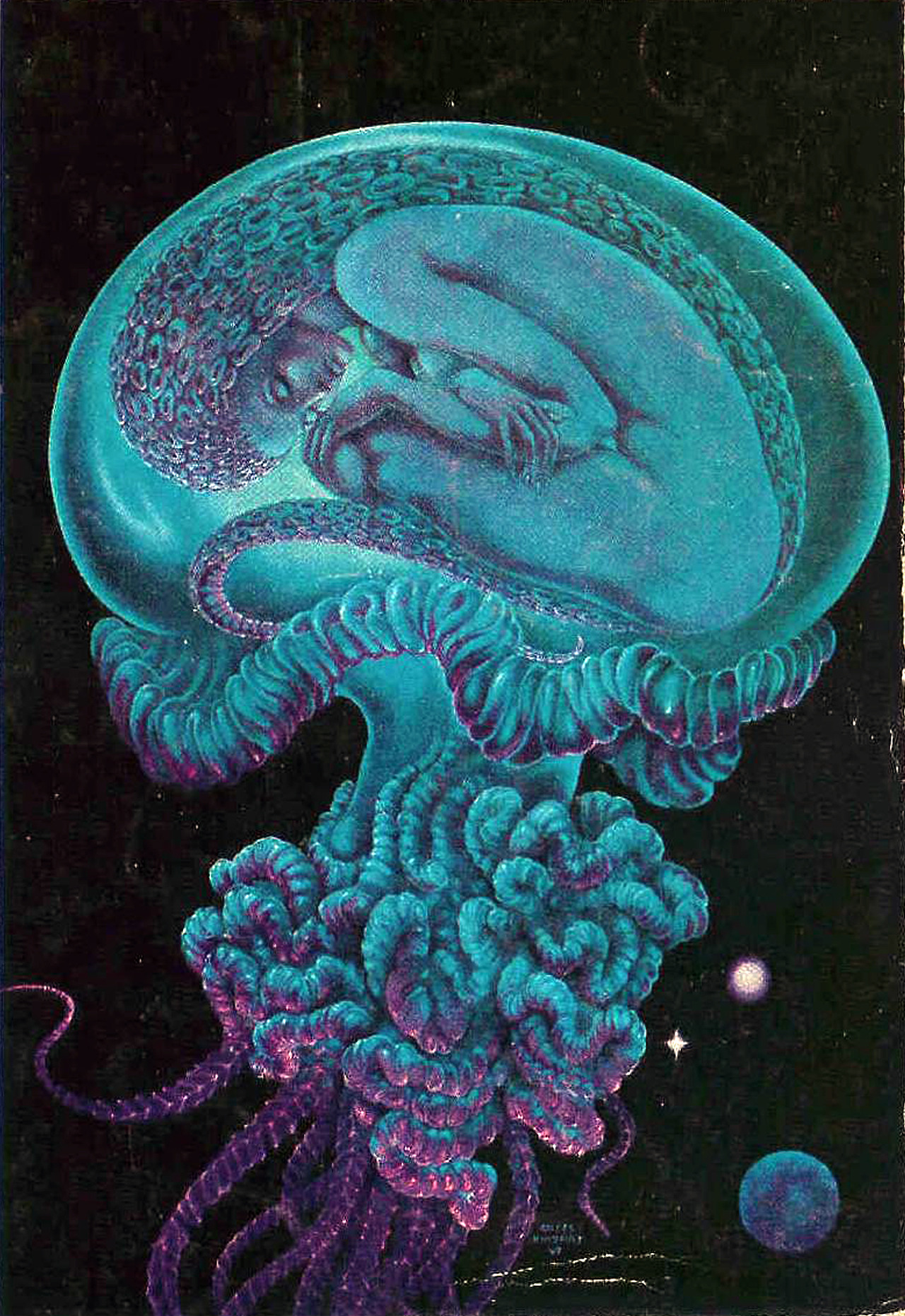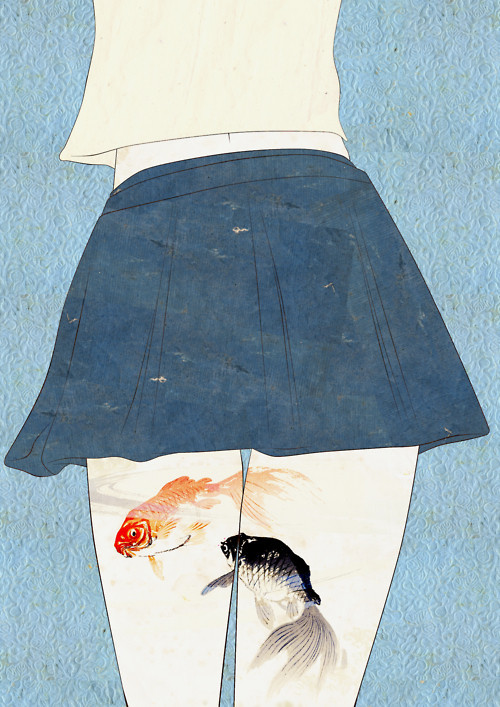 When planets cluster in Pisces, when they make soft, secretive nods to Neptune, and when they drift into the shadowy realm of the 12th house—the result is often someone whose spirit is tuned into the universe. The sorrow here isn’t always the loud, crashing kind—it’s the ache of seeing suffering you can’t quite fix. Pisces, with its emblem of two fish swimming in opposite directions, is caught between the infinite and the intimate—one eye on the divine, the other blinking back tears on Earth. Neptune, the planet of dreams, delusions, and divine love, offers visions. It’s the voice in the night saying, there’s more, while simultaneously stripping away all that anchors you to certainty. And the 12th house is the hidden part of the soul, filled with collective longings, forgotten griefs, and psychic residue. Together, these energies not only mark sorrow—they carve out a spiritual sensitivity, a porousness of the soul. Such a person feels the emotions of others, perhaps even the collective unconscious. They’re tuned to a different frequency. It can be lonely, but it’s also beautiful.
When planets cluster in Pisces, when they make soft, secretive nods to Neptune, and when they drift into the shadowy realm of the 12th house—the result is often someone whose spirit is tuned into the universe. The sorrow here isn’t always the loud, crashing kind—it’s the ache of seeing suffering you can’t quite fix. Pisces, with its emblem of two fish swimming in opposite directions, is caught between the infinite and the intimate—one eye on the divine, the other blinking back tears on Earth. Neptune, the planet of dreams, delusions, and divine love, offers visions. It’s the voice in the night saying, there’s more, while simultaneously stripping away all that anchors you to certainty. And the 12th house is the hidden part of the soul, filled with collective longings, forgotten griefs, and psychic residue. Together, these energies not only mark sorrow—they carve out a spiritual sensitivity, a porousness of the soul. Such a person feels the emotions of others, perhaps even the collective unconscious. They’re tuned to a different frequency. It can be lonely, but it’s also beautiful.
When planets find themselves in Pisces, they are submerged in a sea of sensitivity and surrender. Pisces is not so much a sign as it is a mood, and it is not about achieving, building, or even understanding in the conventional sense—it’s about dissolving. Ego dissolves. Borders dissolve. Even time seems to soften. A person with such a natal alignment may live in a state of perpetual spiritual homesickness, as though this earthly realm is a mere dream from which they’ve not yet fully awakened. It is a yearning for connection, and for reunion with the divine, the infinite, the One beyond the veil. Neptune, the planet of illusion and transcendence, rules Pisces, and when it aspects personal planets—particularly the Moon, Venus, or the Sun—it casts a dreamlike sheen over the personality. But it’s a bittersweet magic. Neptune doesn’t give freely without asking something in return. It offers visions, intuition, compassion so vast it might seem supernatural—but it also brings confusion, delusion, and the temptation to escape reality altogether. Through addiction, fantasy, martyrdom. The Neptunian soul wants to save the world, but it must first remember to save itself from drowning in its own boundless empathy. And then there is the 12th house. Here lie the things we hide from ourselves, the patterns passed through bloodlines and lifetimes, the sorrows we inherit. A planet in the 12th is like a voice from the unknown—muffled, mysterious, but persistent. It is where we are undone, but also where we are made whole again, if we dare to look. People with strong 12th house placements may find that they carry the pain of others in their bodies, that their dreams speak louder than reality, that solitude isn’t loneliness but necessity. The 12th is where artists are born, where mystics kneel, where souls remember what the waking mind forgets.
So this triad—Pisces, Neptune, and the 12th house—can bring suffering, but also sublime beauty, spiritual insight, and a compassion so vast it threatens to unmake the self. These individuals are often misunderstood because they are operating on frequencies that can’t be picked up by ordinary receivers.
The Unseen
To be Neptunian, or under the sway of strong Piscean currents, is to live with the veil between worlds slightly askew. One foot is planted on the soil of reality, while the other dangles in the infinite—a dangling, drifting soul-foot, brushing against the waters of the collective unconscious. They are walking tuning forks resonating with joy, grief, longing, and love not just from their immediate surroundings but from the great, unseen collective that lies beneath all things.
Neptune, named after the Roman god of the sea, governs the vast, formless spaces within and beyond us. It’s the ruler of the dreamscape, of music that moves you for no logical reason, of emotion that flows unbidden, and of love that transcends the personal. Neptune dissolves, blurs, merges. To be influenced by Neptune is to understand through feeling. Through essence. Through spirit. But of course, this heightened spiritual sensitivity is not without its perils. When you are this open, attuned, you are vulnerable—to beauty and love, but also to manipulation, illusion, and escapism. For every moment of sublime insight, there may be a corresponding plunge into disillusionment. Neptune gives with one hand and takes with the other. It says, “Come closer to the divine,” while quietly hiding the rocks beneath the waves.
And yet, what a gift it is. To see a stranger cry and feel their tears as your own. To know, without explanation, that something invisible binds us all. To see what people could be, in some higher, divine existence. Such is the Piscean-Neptunian blessing. This isn’t a path of logic, but of love. These souls aren’t here to master the material—they are here to soften it, to remind us that this life, for all its noise and chaos, is but a fleeting reflection of something eternal. If your chart resonates with Neptune’s or swims in Piscean waters, you are open. And it can hurt. But in this ache lies a doorway—to compassion, to art, to God.
The 12th house—a place less like a room and more like a dreamscape. It isn’t a place we enter through doors, but through silences. Through longing that seems older than memory. Planets placed here are sensitive. Their energies are absorbed deeply, often unconsciously, and become entwined with a person’s inner landscape—so much so that the native may not even realize how profoundly these influences shape them until much later in life, often through solitude, spiritual awakening, or profound loss.
It governs the hidden corners of life where transformation often begins. It is the house of undoing, but also of unburdening. Suffering may live here, but so too does surrender. It’s where you let go of the mask and commune with the soul. A person with strong 12th house placements is often a vessel for the unseen, the unspoken, the collective grief of humanity. And there’s a strange magic to it. A person with Venus in the 12th might love with the devotion of a mystic—selfless, unconditional, sometimes to their own detriment. A Sun here can lead someone to feel invisible, even to themselves, yet capable of shining a transcendent light through art or compassion. Mars in the 12th may rage in dreams, or fight spiritual battles on behalf of others, without even knowing it.
These individuals often feel a pull toward the spiritual as a necessity. They may become healers, artists, poets—or simply gentle, inexplicably wise souls in ordinary jobs, quietly holding space for others. They are often misunderstood, even by themselves, until solitude or suffering cracks them open to the vastness within. Because this is what the 12th house does—it dissolves. It strips the ego bare and invites us to remember what we’ve forgotten: that we are not alone, not separate, not even entirely us. It’s not a house of weakness, as some mistakenly say. It’s a house of depth. Of surrender. Of compassion born not of choice, but of resonance. To live with 12th house energy is to carry the ache of being human, and to know, in some quiet corner of your being, that behind the veil of form, all things are connected.
The Key to the Sea
To be marked by sorrow astrologically isn’t to be sentenced to sadness. It is to be granted a key, however heavy, to the hidden rooms of the human heart. It’s a journey that leads to life’s deeper core. The sorrow here isn’t the loud grief of catastrophe, but the quiet knowing. It is the sorrow of seeing a smile that hides pain. Of recognizing, even in joy, the transience that sits just beneath it. It is a soul-deep melancholy, but braided with beauty, because it comes with the awareness that nothing is truly separate—not joy from grief, not self from other, not spirit from the world.
For those steeped in Piscean and Neptunian currents, emotion is a medium, a language, a form of communion. They do not merely observe suffering; they become it. They carry others in their hearts like songs. And this isn’t weakness. It is a kind of grace. A mystical sensitivity that grants them access to realms of expression and understanding inaccessible to those hardened by certainty and logic. Art becomes their sanctuary. Through painting, music, or dance, they give form to the formless, voice to the voiceless. In their creations, others find reflection and release. And in spiritual practice—whether formal religion, wild mysticism, or quiet communion with nature—they find a home. Spirituality doesn’t always give them answers, but it gives them context—a backdrop against which their boundless feelings makes sense.
The 12th house isn’t content with the dramas of the personal ego, nor satisfied with the realm of achievement or the tidy compartments of selfhood. It opens the door—sometimes gently, sometimes like a wave crashing through the hull—to the boundless awareness that everything suffers, everything breathes, everything is. And in this revelation, it asks us to feel it all. To become a vessel. Those who find themselves cradled in the energies of the twelfth are often born with their hearts ajar. They are tuned to the cries of the earth, the rustling agony of a tree being felled, the silent mourning of animals, the forgotten grief embedded in soil and stone. Their compassion, therefore is a state of being. A holy ache. A direct line to the pulse of existence.
This is where the spiritual dimension of the twelfth house becomes luminous. It isn’t in the grand rituals or lofty ascension plans, but in the quiet acts of unselfing. In moments where the barrier between “me” and “you” dissolves, and what remains is just being, in all its fragile, interconnected beauty. To live with this awareness is never easy—it can feel like being skinned alive to the world—but it is necessary, and profound. Because through it, true healing flows.
And while society may urge such souls to harden, to shield, to “be realistic,” the twelfth house says otherwise. It says: feel deeper. See more. Be the place where the suffering ends, hold it with love. And this is task of the twelfth house dweller—not to fix the world, but to soften it. Not to escape suffering, but to sit beside it with open hands and say, I see you. I know you. You are not alone. It is the house of monks and mystics, but also of quiet carers, artists who paint without glory, lovers who give without demand. Those who embody the truth that we are all waves of one great ocean, briefly rising, briefly falling.
“The 12th house is traditionally styled the house of sorrow, and afflictions in it will not only cause grief and misfortune, but also tend to bring the native in contact with the sad aspects of life. Planets strong in this house, however, raise the native from low beginnings, and often bestow benefit through charity and charitable institutions. In its highest aspects, the house denotes the release from sorrow through resignation and atonement.” C.E.O Carter – The Encyclopedia of Psychological Astrology
Here is a conversation by astrologer Kathleen Burke discussing the distinctions between Aquarius and Pisces, and how Pisces’ sensitivity to suffering takes center stage during an intimate dinner.
One evening when discussing the wedding date, she happened to ask, “by the way, what do you actually do all day long? I know that you’re a laboratory scientist, but I can’t really imagine what that means. I have no background in Sciences.” “Oh,” he said, “Well, right now we’re involved in a very interesting project doing research for a company that manufactures shampoo. The company wants to be sure the product won’t hurt people’s eyes or cause allergies, so they have us testing it on rabbits. Rabbits, you see have particularly sensitive eyes, so if rabbits aren’t adversely affected by the shampoo that means most likely that people won’t be either…” She cut him off abruptly. “What? You mean your job is to squirt poisonous chemicals into the eyes of defenseless animals? Such cruelty. Well, forget it, our engagement is off. I certainly won’t be comfortable with you anymore, knowing your work was so sadistic.”
The misunderstood Piscean is eternally typecast as the weeping willow of the zodiac, a fragile soul adrift on an ocean of emotions. But such a view is a travesty, a shallow caricature of a sign whose depth cannot be measured in moods alone. What some call neurotic, the mystic calls attuned. What others dismiss as self-pity may, in truth, be the weary compassion of someone who’s been carrying not just their own suffering, but yours, mine, and the cat’s—and the sorrow of the ancient oak down the street.
Pisces, cradled in the arms of Neptune and shadowed by the 12th house, exist not on the surface of things but in their essence. They don’t just walk through life; they float, merge, dissolve, absorb. And it’s overwhelming. To live so porous, so spiritually osmotic, is to risk losing your shape in a world obsessed with edges. The melancholy often associated with Pisces isn’t a weakness—it’s knowledge. It’s the melancholia of the old soul who sees beyond the gloss of things, who feels the suffering stitched into silence, who dreams of how the world could be and weeps for how it is. But this sadness is alchemical. It compels them to write, to paint, to weep in the arms of the divine. It pushes them towards spiritual practices because they are returning—to something whole, something real, something beyond the plastic theatre of daily life.
And Neptune makes this inner world so vivid, so luminous, that the external world often feels pale by comparison. This is where the disconnection creeps in. It isn’t because Pisceans are aloof, but because reality, in all its harshness and banality, sometimes pales in comparison to the beauty they’ve touched in their dreams, their meditations, their art. But here’s what’s rarely said: this very sensitivity, when properly fed, is a spiritual superpower. These individuals can tune into the pain others hide, offer comfort without needing words, and see the divine spark even in the broken and battered. So let’s not pathologize their sadness. Let’s honor it as we would the cry of a violin—aching, but also achingly beautiful.
A Soul-Sickness
Part of the Piscean path isn’t adorned in glittering mysticism or romantic sighs, but in the heavy silence of soul-sickness. This is where the Neptunian tide, unchecked, can pull the spirit so far from shore that the idea of returning seems irrelevant. The sorrow born of this astrological triad—Pisces, Neptune, and the 12th house—can be paralyzing. It can drain the life-force until even the act of rising from bed feels too much. And because this sorrow isn’t always attached to a concrete event or visible trauma, it becomes harder to explain, harder still to justify. It is the ache of the soul forgetting why it incarnated at all.
In this nebulous realm, where emotions have no form and reality has no grip, the Piscean may drift with despair. Their openness—their vulnerability—has made them absorb more than they were ever meant to carry. They feel the despair of the collective. And in this overwhelming tide, detachment is not so much a choice as a psychic defense mechanism. It is easier, sometimes, to slip into dreams, to numb, to vanish—than to engage with a world that often feels too real.
But here lies the great calling, the soul-quest of Pisces: they mustn’t drown in the ocean of feeling, but become of it—to learn to float, even surf, to build rafts from imagination and purpose, to return from the depths bearing the gifts of understanding, art, and empathy. For bringing the divine insight of Pisces down to Earth, where it can heal, uplift, and guide. And this is where those around them come in—not to drag them from the water, but to remind them they have legs. That their dreams matter. That their art is needed. That their presence, even in its gentleness, has weight and worth.
Memories of Home
You see, when a person is born with their chart soaked in the waters of Pisces, dream-drenched by Neptune, and shaded by the 12th house, they don’t simply wish for a better world—they remember one. Somewhere in their essence lies the memory of divine harmony, of love untainted, of compassion unchallenged. And so, when they open their eyes to this world—with its violence, its shouting, its division—they feel betrayal. A betrayal of the soul’s deepest knowing.
They see cruelty and feel it as a wound. Racism, intolerance, brutality—these aren’t abstract evils to them. They are violations of something elemental. It isn’t all naïvety, it’s that they remember what the world could be, and the contrast is so jarring, it shakes their very foundation. So they retreat out of preservation. The noise of the world is too loud for ears attuned to angels. And as they withdraw, the outer world becomes even more distant—like a scene through fogged glass—and the inner world, rich and saturated with emotion, becomes both heaven and hell. They may create. They may dream. They may drift. But always there’s this ache—Why is it like this? Why can’t we be kind? The pain arises because they see the soul of the world and compare it to its actions. And while some harden, become cynical, or lash out, the Piscean soul feels. Their challenge is to remain—to be in this world but not of it. To channel their pain into art, their dreams into service, their sorrow into grace. To weep, but also to witness. To love anyway. To keep believing in a kind of defiance of the cruelty. This the quiet heroism of the Piscean path.
The quiet tragedy of those ruled by Neptune: their pain is not entirely their own. It is borrowed, absorbed, taken in through skin. They feel the bruises of strangers, the silence of the unheard, the tears of the voiceless—from children in war-torn lands to animals caged in suffering, to the lonely elder waiting for someone to call. It is heartbreak, the music of sorrow, playing on repeat. They are the spiritual empaths, universal sponges, absorbing so much pain that they risk drowning in it. And in this sea of feeling, futility creeps in. What can one soft soul do against systems of cruelty, centuries of hatred, the juggernaut of human unkindness? Their arms are not long enough to hug the world. Their voice, no matter how beautiful, cannot always drown out the cries.
And so they suffer from the infinite scope of their love. They want to heal everything. But they forget that they were not made to fix the world—they were made to remind it. Their power doesn’t lie in political conquest or corporate reform, but in subtle magic. The sense of victimhood that is felt is born from exhaustion. From trying to carry pain that was never theirs alone to bear. The solution isn’t to harden, but to find small actions—comforting a friend, rescuing a stray, writing something that brings a stranger to tears. These are not nothing. These are everything. So to the Neptunian soul who feels helpless: your sorrow is real, but it is not the end. It is the beginning of empathy that, if channeled with care, can ripple out further than you know. Learn when to open, when to close. Give not all of yourself, but the part that regenerates in love.
One time I was dreaming, carried by the wake and cradled by All-Mother, rising and falling in the rhythms of her heartbeat. When I was low, I slept, but when I rose high, I could see and hear for the first time.” John Lawson












